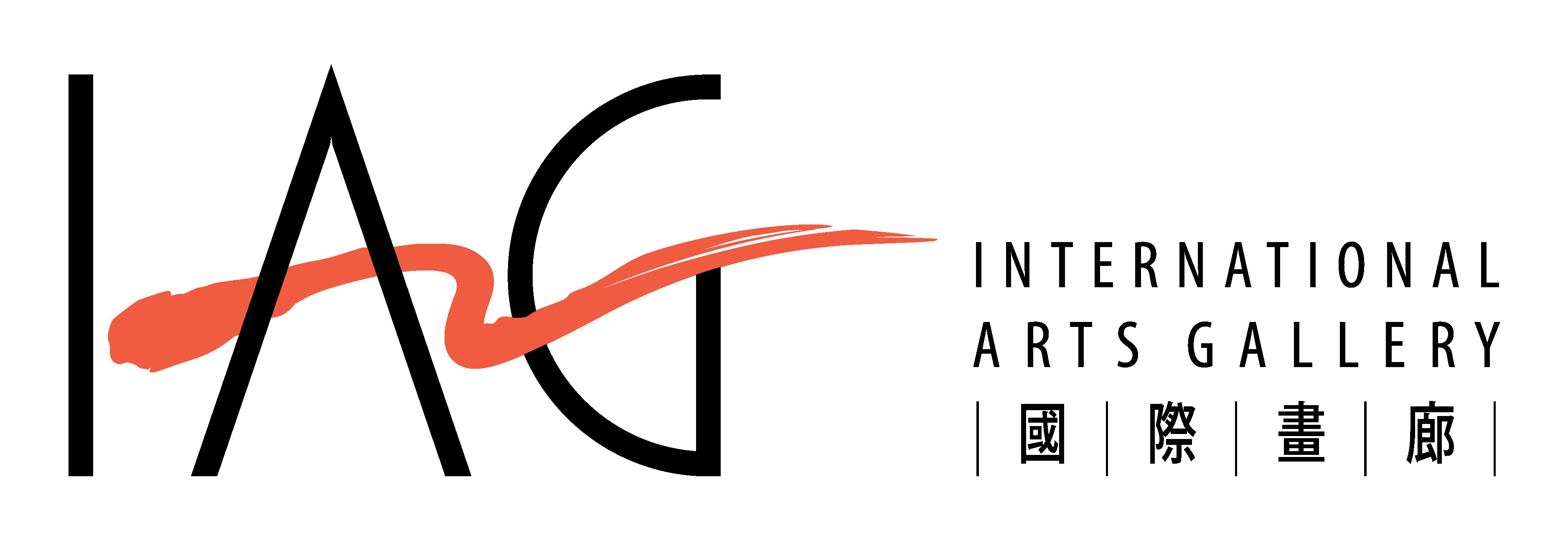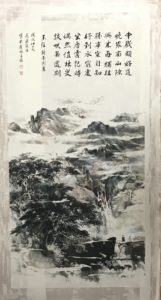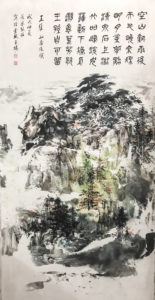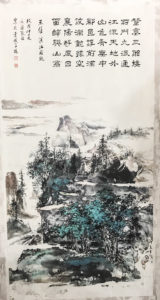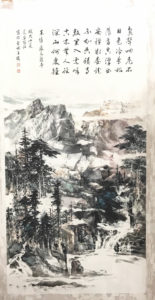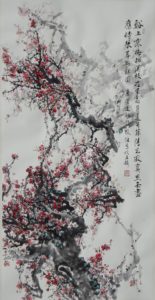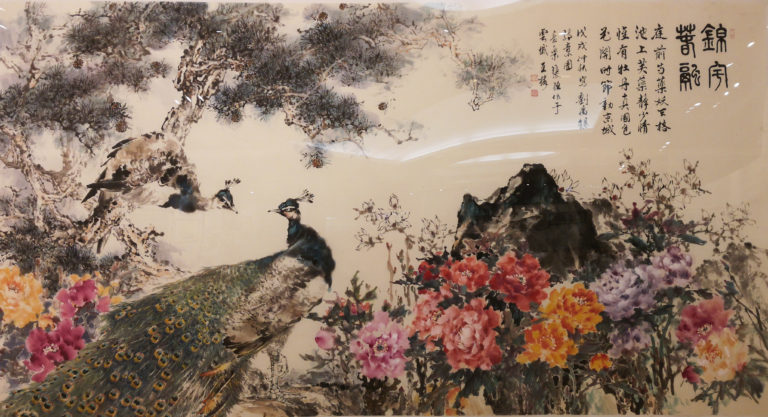張恆
1941年生,1992年移民加拿大,歷任中學師院教職21年,并任教材編審,國際藝術交流委員會主任委員,加拿大中華文化藝術總會會長,加拿大中華書畫聯合會總召集人,曰本倉門書道墨畫研究會,德國竹橋書畫藝術研究部,中國書畫報,徐悲鴻藝苑,朱德紀念館書畫交流委員會等顧問,復旦大學研究員。世界華人慶奧運名家書畫大展組委會副主任,奧運之光長卷創作名家之一,2009年榮獲特授國際突出貢獻書畫藝術家稱號。
恆是書畫家也是藝術教育家,六十餘年的書畫教學與創作生涯從不間斷。對中西各家主義、畫派有
深厚的研究,极力倡導心象主義、畫派,成立域外畫派第一人。
四十餘年來在海內外舉辨60餘次個展。近三十年來他深研北美文化,創立北美山水畫學會,潛心寫生創作北美山水畫,並完成北美山水畫<洛磯頌>感悟洛磯情252米長卷,2017年 慶祝加拿大150週年國慶。應邀於溫哥華列治文市政廳、保利藝術館兩地展出。
現任:
- 國際心象藝術研究中心主席。
- 加拿大中國畫學會會長
- 加拿大中華文化藝術總會永久榮譽會長
- 北美山水畫學會會長
- 溫哥華國際畫廊藝術總監
作品收藏:
台北博物館、國父紀念館、墨尼黑民俗博物館、槟城博物館、旅順博物館、煙台美術博物館、中國美術館、太原美術館….。政商領袖、收藏家等收藏。
出版:
首創中國畫譜、教學錄影帶。張恆隸書正氣歌、張恆書畫專輯、張恆話畫、張恆談藝、大美叢書等。
John CHEN
Born in 1941 in Taiwan. Immigrated to Canada in 1992. He has been in the teaching post for 21 years, and responsible for edition of teaching curriculum. He assumed the following posts and titles: Chief Director of the International Arts Exchange Association; President of the Chinese Culture Arts Association of Canada; Coordinator in Chief of the Joint association of the United Chinese Arts Council of Canada; Honorary Advisers of Chon Mun Calligraphy and Ink Paintings Study Center of Japan; Bamboo Bridge Calligraphy Paintings and Arts Study Center of Germany; China Calligraphy and Paintings Newspaper,; XU Bei-Hong Arts Council as well as the Exchange Committee of the Chu Tak Memorial
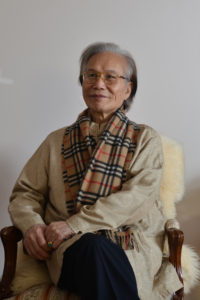
張 恒
JOHN CHEN
參展作品
T-02-01-王維《終南別業》詩意圖_69x135cm_$100,000 CAD
詩詞: 出自於唐代王維《終南別業》
中歲頗好道,晚家南山陲。
興來每獨往,勝事空自知。
行到水窮處,坐看雲起時。
偶然值林叟,談笑無還期。
RETREAT AT MOUNTain ZHONGNAN
poem on the painting by wang, wei
699-761 AD, China
After middle age, there is a strong heart, It was not until the later years that I settled in the middle of the mountain. When you are interested, you often go to play alone. Have a happy life and appreciate yourself. Or go to the end of the water to seek the source, The clouds that rise or look at each other are ever-changing. Occasionally met a village father in the forest, Even chatting with him, chatting and forgetting to return home.
T-02-02-王維《山居秋暝》詩意圖_69x135cm_$100,000 CAD
詩詞: 出自於唐代王維《山居秋暝》
空山新雨後,天氣晚來秋。
明月松間照,清泉石上流。
竹喧歸浣女,蓮動下漁舟。
隨意春芳歇,王孫自可留。
AUTUMN EVENING IN THE MOUNTAINS
poem on the painting by wang, wei
699-761 AD, China
After a new rain, the mountains became more and more quiet, and the night fell, and the breezy style made people feel more autumn. The bright moonlight reflects the pine forest, and the spring water flows through the stone. There was a burst of laughter in the bamboo forest. It turned out that the laundry girls returned, and the lotus leaves floated. It was a fishing boat that went down the river. Although the fragrance of the spring has long since passed away, I am enchanted by this wonderful autumn, still longing for.
T-02-03-王維《漢江臨眺》詩意圖_69x135cm_$100,000 CAD
詩詞: 出自於唐代王維《漢江臨眺》
楚塞三湘接,荊門九派通。
江流天地外,山色有無中。
郡邑浮前浦,波瀾動遠空。
襄陽好風日,留醉與山翁。
Distant View of Han River
poem on the painting by wang, wei
699-761 AD, China
The Han River flows through the Chase and is also folded into Sanxiang. From the west, Jingmen goes east to the Jiujiang River.
It seems that the river seems to flow to the outside of the heavens and the earth. If you look at the mountains, you will have nothing to lose.
The capital city on the shore seems to float on the surface of the water, and the water and the sky are connected to the waves.
The scenery of Fuyang is indeed intoxicating. I would like to sip along with the mountain stalks here.
T-02-04-王維《過香積寺》詩意圖_69x135cm_$100,000 CAD
詩詞: 出自於唐代王維《過香積寺》
不知香積寺,數里入雲峰。
古木無人徑,深山何處鐘。
泉聲咽危石,日色冷青松。
薄暮空潭曲,安禪制毒龍。
visiting Xiang Ji Temple
poem on the painting by wang, wei
699-761 AD, China
I don’t know where the Xiangji Temple is, and it took a few miles to enter the peaks of the white clouds. There are no pedestrian paths in the ancient woods, and there are no bells in the mountains. The springs meet the sound of the rocks, and the sun shines on the deep pine forest. The twilight descends on the curved corner of the tranquil pool, and Enran meditation uniforms all kinds of desires.
T-02-05-崔道融《梅》詩意圖_69x136cm_$100,000 CAD
詩詞: 出自於唐代崔道融《梅》
溪上寒梅初滿枝,夜來霜月透芳菲。
清光寂寞思無盡,應待琴尊與解圍。
plum
poem on the painting by cui, daorong
unknow AD, China
There is a plum tree just full of flowers along the creek. The frost and cold moonlight at night reveal the winter fragrant Philippine. Feeling lonely in the cold moonlight with chill, Acacia has no end, waiting for the master who will play the piano to help me solve the knot.
T-02-06-錦宇春融_100x300 cm_$150,000 CAD
詩詞: 出自於唐代劉禹錫《賞牡丹》
庭前芍藥妖無格, 池上芙蕖淨少情。
唯有牡丹真國色,花開時節動京城
Peony
poem on the painting by Liu, Yuxi
772-842 AD, China
The peony in front of the court is glamorous but lacks the bones. The lotus in the pool is clean and elegant but lacks charm. Only the peony is the true Tianzi national color, and the flowering season has attracted countless people to appreciate and alarmed the entire Luoyang city.
